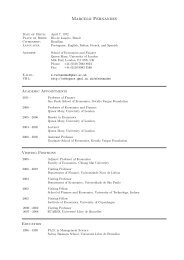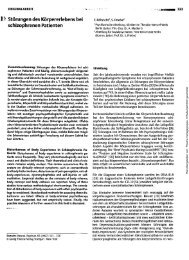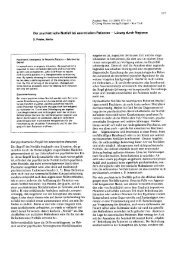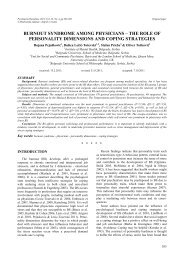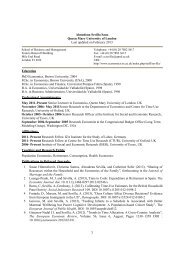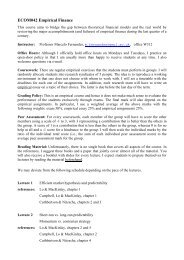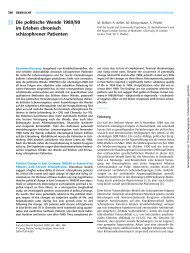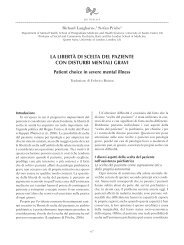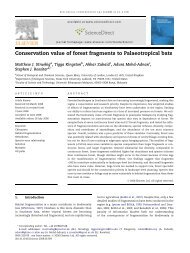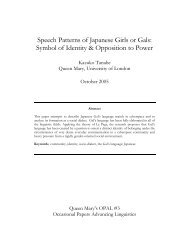Proofs - Personal Webspace for QMUL - Queen Mary, University of ...
Proofs - Personal Webspace for QMUL - Queen Mary, University of ...
Proofs - Personal Webspace for QMUL - Queen Mary, University of ...
Create successful ePaper yourself
Turn your PDF publications into a flip-book with our unique Google optimized e-Paper software.
S2 A. Heinz, U. Kluge / European Psychiatry 27 (2012) / supplement n°2 / S1-S3<br />
Refl ection on culture includes a refl ection on European<br />
prejudices and implicit assumptions about mental health and<br />
its impairment. There<strong>for</strong>e, our articles address the historical<br />
and cultural roots <strong>of</strong> basic clinical and psychological concepts <strong>of</strong><br />
the body, soul, emotions and self. We also discuss explanatory<br />
models <strong>of</strong> diseases and their context- specifi c expressions, e.g.<br />
the individual adoption <strong>of</strong> global discourses <strong>of</strong> disease in locally<br />
specifi c ways [13,21].<br />
In 2008 we had the chance to publish a fi rst supplement on<br />
the topic “Transcultural Psychiatry in Europe” in the European<br />
Psychiatry [22] and discussed epidemiological data regarding<br />
mental disorders in migrants, barriers in communication, limited<br />
access to treatment and attempts to improve the situation by<br />
competence trainings. In the meantime, several lines <strong>of</strong> funding<br />
(European Commission, the German BMBF, VW- Foundation)<br />
provided ressources to deepen those approaches and fi ndings,<br />
particularly with respect to major migrant communities in different<br />
parts <strong>of</strong> Europe.<br />
In the fi rst part <strong>of</strong> the supplement, social and individual<br />
factors determining mental health <strong>of</strong> migrants in Europe are<br />
addressed with a special focus on gender aspects and stress<br />
factors resulting from social exclusion. Today, epidemiological<br />
studies <strong>of</strong> mental health in migrants are <strong>of</strong>ten limited by the<br />
low response rate <strong>of</strong> contacted individuals in the chosen sample.<br />
There<strong>for</strong>e Demet Dingoyan and colleagues [6] conducted focus<br />
groups to assess ressources and barriers in the attendance at<br />
scientifi c studies. Marion Aichberger and colleagues [1] examined<br />
the impact <strong>of</strong> socioeconomic factors on emotional distress<br />
in women with and without Turkish migratory background<br />
living in Germany. Zohra Bromand and co- workers [4] describe<br />
risk and resilience factors contributing to mental distress and<br />
highlight the advantages and challenges <strong>of</strong> close family ties <strong>for</strong><br />
female migrants. The effects <strong>of</strong> social stigma on the manifestation<br />
<strong>of</strong> affective disorders and somatization in women with<br />
migratory background are reported by Amanda Heredia and<br />
others [12], who challenge the hypothesis that somatization<br />
rather than depressive symptoms are displayed in women with<br />
a Mediterranean background.<br />
Diagnostic instruments <strong>for</strong> the assessment <strong>of</strong> mental disorders<br />
in migrants and problems <strong>of</strong> classifi cation are discussed<br />
in the second part <strong>of</strong> the supplement. Fidan Mammadova [16]<br />
present a cultural and lingual adaptation <strong>of</strong> standardised depression<br />
ratings in Azerbaijan and discuss differences between<br />
Russian and Azerbaijani speaking women. Andreas Heinz and<br />
colleagues [11] describe historical and intercultural differences<br />
in the construction <strong>of</strong> the self, address (post- )colonial distortions<br />
<strong>of</strong> the respective concepts and describe their relevance <strong>for</strong> the<br />
diagnosis <strong>of</strong> mental disorders. Fatima Napo and co- workers [18]<br />
assess whether key diagnostic symptoms <strong>of</strong> schizophrenia<br />
can be found among patients suffering from acute psychoses<br />
in Mali and among West- African migrants in Europe. Finally,<br />
Azra Vardar and colleagues [26] describe differences and similarities<br />
in explanatory models <strong>of</strong> mental disorders depending<br />
with respect to diverse factors such as education, gender and<br />
migratory background.<br />
In the third section <strong>of</strong> this supplement, studies address challenges<br />
<strong>for</strong> the health care system when it is geared towards the<br />
needs <strong>of</strong> migrants in Europe. Ulrike Kluge and colleagues [15]<br />
describe diverse health care systems in Europe and focus on<br />
service use, diversity <strong>of</strong> staff members in health care services and<br />
the provision <strong>of</strong> translators. Simone Penka and co- workers [19]<br />
introduce an assessment tool that measures the degree <strong>of</strong><br />
“intercultural openess” <strong>of</strong> community mental health services.<br />
S<strong>of</strong>i e Bäärnhielm and Mike Mösko [2] give an overview over<br />
cross- cultural training programms and discuss the advantages<br />
and limitations <strong>of</strong> such interventions. Inge Missmahl and colleagues<br />
[17] describe basic diagnostic tools <strong>for</strong> the assessment <strong>of</strong><br />
mental disorders and their implementation in training programs<br />
<strong>for</strong> medical practitioners, students and psychosocial counsellors<br />
based on experiences in Afghanistan.<br />
Finally, Arthur Kleinman [14] discusses challenges and<br />
perspectives <strong>for</strong> the organisation <strong>of</strong> mental health care systems<br />
oriented towards the diverse needs <strong>of</strong> patients in a globalized<br />
world.<br />
Altogether, the studies presented in this supplement illustrate<br />
the diverse approaches required in research, practice and<br />
training to improve the promotion, access, delivery and quality <strong>of</strong><br />
health services <strong>for</strong> migrants and ethnic minorities. As discussed<br />
in the articles <strong>of</strong> this supplement, a wider view on cultural, social,<br />
gender and age differences is necessary to meet the needs <strong>of</strong> the<br />
respective groups. Human diversity clearly transcends cultural<br />
differences and requires fl exible responses to different needs. To<br />
address these diverse settings and experiences, the integration<br />
<strong>of</strong> quantitative and qualitative research is warranted to promote<br />
comprehensive approaches in the area <strong>of</strong> mental health. Besides<br />
increased epidmiological research, studies on the improvement<br />
<strong>of</strong> communication in the respective settings and a fi ght against<br />
discrimination within the health care system are important<br />
tasks <strong>for</strong> a health care system that is geared towards inclusion<br />
<strong>of</strong> patients, relatives and pr<strong>of</strong>essionals with diverse backgrounds<br />
and experiences.<br />
<strong>Pro<strong>of</strong>s</strong><br />
Acknowledgements<br />
We are especially grateful to all the authors, to the internal<br />
and external reviewers.<br />
We would like to thank them all <strong>for</strong> their contribution!<br />
We also thank the EPA section <strong>of</strong> Transcultural Psychiatry<br />
<strong>for</strong> discussions and support.<br />
Confl ict <strong>of</strong> interest statement<br />
None.<br />
Literature<br />
[1] Aichberger M C, Bromand Z, Heredia Montesinos A, Temur- Erman S,<br />
Mundt A, Heinz A, Rapp M A, Schouler- Ocak M. Socio- economic status<br />
and emotional distress <strong>of</strong> female Turkish immigrants and native German<br />
women living in Berlin. Eur Psychiatry 2012;27:S10-S16.<br />
[2] Bäärnhielm S, Mösko M. Cross- cultural training in mental health care –<br />
challenges and experiences from Sweden and Germany. Eur Psychiatry<br />
2012;27:S70-S74.<br />
[3] Bloom D E, Cafi ero E T, Jané- Llopis E, Abrahams- Gessel S, Bloom L R,<br />
Fathima S, Feigl A B, Gaziano T, Mowafi M, Pandya A, Prettner K, Rosenberg<br />
L, Seligman B, Stein A Z, Weinstein C. The Global Economic Burden <strong>of</strong><br />
Noncommunicable Diseases. World Economic Forum & Harvard School<br />
<strong>of</strong> Public Health, Geneva; 2011.<br />
[4] Bromand Z, Temur- Erman S, Yesil R, Heredia Montesinos A, Aichberger M<br />
C, Kleiber D, Schouler- Ocak M, Heinz A, Kastrup M C, Rapp M A. Mental<br />
01_Edito.indd S2 14/06/2012 14:48:47



